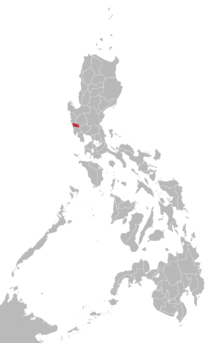Botolan language
| Botolan | |
|---|---|
| Botolan Sambal | |
| Native to | Philippines |
| Region | some parts of Zambales province, Luzon |
Native speakers | 33,000 (2000)[1] |
| Official status | |
| Regulated by | Komisyon sa Wikang Filipino |
| Language codes | |
| ISO 639-3 |
sbl |
| Glottolog |
boto1242[2] |
|
Area where Botolan Sambal is spoken according to Ethnologue | |
Botolan is a Sambalic language spoken by 32,867 (SIL 2000) Sambal, primarily in the Zambal municipalities of Botolan and Cabangan in the Philippines.
Phonology
Botolan has 20 phonemes: 16 consonants and four vowels. Syllable structure is relatively simple. Each syllable contains at least a consonant and a vowel.
Vowels
Botolan has four vowels. They are:
- /a/ an open front unrounded vowel similar to English ‘father’
- /e/ an close-mid front unrounded vowel similar to German ‘Elefant’
- /i/ a close front unrounded vowel similar to English ‘machine’
- /u/ (written as ‘o’) a close back unrounded vowel similar to English ‘flute’
There are five main diphthongs: /aɪ/, /uɪ/, /aʊ/, /ij/, and /iʊ/.
Consonants
Below is a chart of Botolan consonants. All the stops are unaspirated. The velar nasal occurs in all positions including at the beginning of a word.
| Bilabial | Dental | Palatal | Velar | Glottal | ||
| Stops | Voiceless | p | t | k | - [ʔ] | |
| Voiced | b | d | g | |||
| Affricates | Voiceless | (ts, ty) [tʃ] | ||||
| Voiced | (dy) [dʒ] | |||||
| Fricatives | s | (sy) [ʃ] | h | |||
| Nasals | m | n | (ny) [ɲ] | ng [ŋ] | ||
| Laterals | l | (ly) [lj] | ||||
| Flaps | r | |||||
| Semivowels | w | j | ||||
Note: Consonants /d/ and /ɾ/ can sometimes interchange as they were once allophones.
Stress
Stress is phonemic in Botolan. Stress on words is very important, they differentiate words with the same spellings, but with different meanings, e.g. hikó (I) and híko (elbow).
Historical sound changes
Many words pronounced with /s/ and /ɡ/ in Filipino have /h/ and /j/, respectively, in their cognates in Botolan. Compare hiko and bayo with the Filipino siko and bago.
Sample texts
The Lord’s Prayer
Version from Matthew
Tatay nawen ya anti ha katatag-ayan,
Hay ngalan mo ay igalang dayi nin kaganawan.
Andawaten nawen ya tampol kayna dayin mag-arí.
Mangyari dayi ya kalabayan mo bayri ha babon lotá
Bilang ombayro ha katatag-ayan.
Hapa-eg ay biyan mo kayin pamamangan ya
angka-ilanganen nawen.
Patawaren mo kayi ha kawkasalanan
nawen bilang pamatawad nawen ha nakapagkasalanan konnawen.
Agmo kayi biyan ma-irap ya pagsobok boy
ipakarayó mo kayi koni Satanas.[3]
Philippine national proverb
Below is a translation in Botolan of the Philippine national proverb[4] “He who does not acknowledge his beginnings will not reach his destination,” followed by the original in Filipino.
- Botolan: “Hay ahe tanda nin nanlek ha pinangibatan, ay ahe makalateng ha lalakwen.”
- Filipino: “Ang hindi marunong lumingon sa pinanggalingan ay hindi makararating sa paroroonan.”
See also
References
- ↑ Botolan at Ethnologue (18th ed., 2015)
- ↑ Nordhoff, Sebastian; Hammarström, Harald; Forkel, Robert; Haspelmath, Martin, eds. (2013). "Botolan Sambal". Glottolog. Leipzig: Max Planck Institute for Evolutionary Anthropology.
- ↑ Botolan Sambal
- ↑ National Philippine Proverb in Various Philippine Languages
External links
- Grammar sketch of Botolan
- Sample recordings from the GRN Network, in Botolan
- Hay Halita nin Diyos, Bible verses in Botolan
| ||||||||||||||
| ||||||||||||||||||||||||||||||||||||||||||||||||||||||||||||||||||||||||||||||||||||||||||||||||||||||||||||||||||
| ||||||||||||||||||||||||||||||||||||||||||||||||||||||||||||||||||||||||||||||||||||||||||||||||||||||||||||||||||||||||
